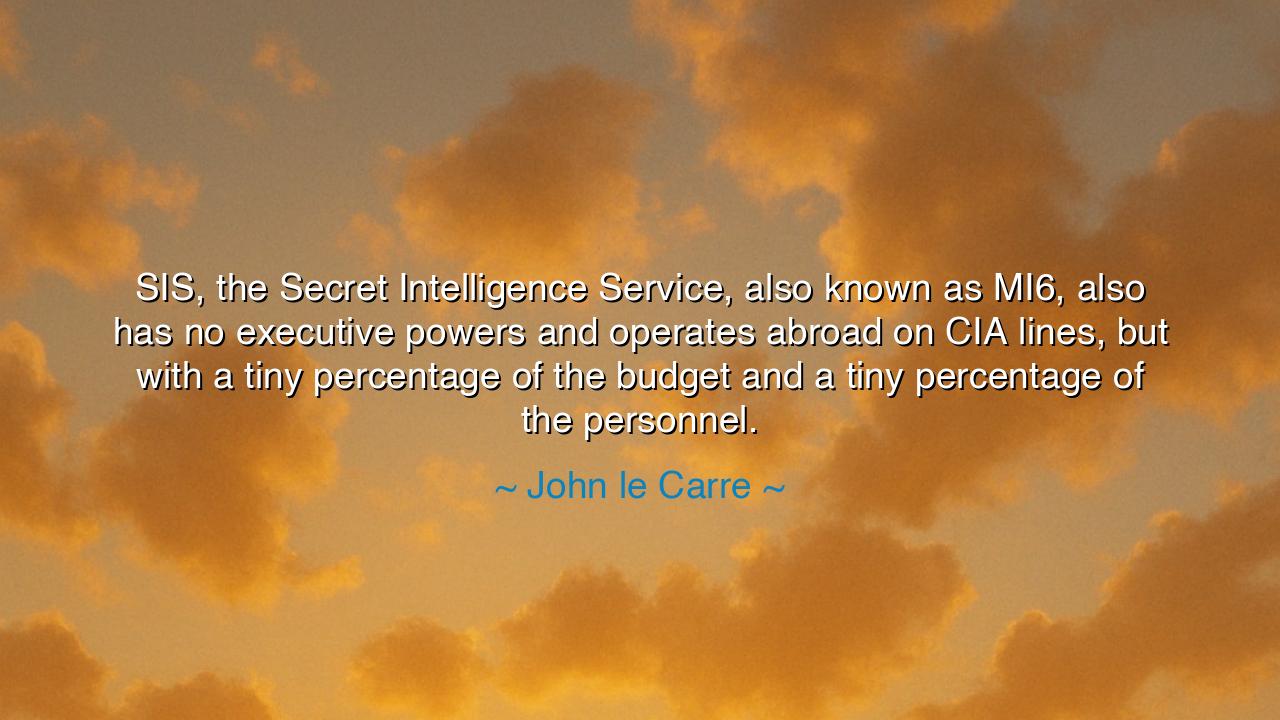
SIS, the Secret Intelligence Service, also known as MI6, also has
SIS, the Secret Intelligence Service, also known as MI6, also has no executive powers and operates abroad on CIA lines, but with a tiny percentage of the budget and a tiny percentage of the personnel.






“SIS, the Secret Intelligence Service, also known as MI6, also has no executive powers and operates abroad on CIA lines, but with a tiny percentage of the budget and a tiny percentage of the personnel.” Thus spoke John le Carré, the master chronicler of shadow and silence, whose pen revealed the hidden world where nations contend not with armies, but with whispers. In this statement, modest in tone yet rich in implication, le Carré unveils the paradox of British intelligence — an organization not defined by its size or wealth, but by its discretion, subtlety, and endurance. Behind these words lies the quiet wisdom that true power does not always roar; sometimes, it moves in silence, through the art of patience and the precision of intellect.
Le Carré, born David Cornwell, once walked among the very shadows he later wrote about. Before becoming a novelist, he served within the SIS (Secret Intelligence Service) during the tense years of the Cold War. His experience lent his stories the unmistakable air of truth, for he had seen firsthand the difference between the myth and the reality of espionage. His remark on MI6’s humble resources compared to the mighty CIA is more than commentary — it is a meditation on the nature of influence. Britain’s secret service, smaller in means, was forced to rely not on dominance but on craftsmanship, on the intelligence of character rather than the abundance of machinery. In this, there lies a timeless truth: that greatness is not measured in numbers, but in the quality of mind and purpose.
To understand this saying, one must remember the age from which it arose — the Cold War, an era of deception and danger, when nations sought knowledge more fiercely than they sought peace. The CIA, born of American might and resources, became a vast empire of information. MI6, by contrast, remained a slender hand extended across continents, operating with quiet elegance, depending on the loyalty and ingenuity of a few. Le Carré’s words remind us that while others might command legions, the true art of intelligence is in knowing rather than controlling, in seeing clearly rather than striking first.
Consider the tale of the Cambridge Five, those infamous double agents who, under the guise of service to Britain, betrayed her secrets to the Soviet Union. Their actions shook the SIS to its core, exposing not only the dangers of espionage but the fragility of trust itself. Yet, from this humiliation, MI6 did not crumble. It adapted. It learned to value caution, patience, and psychological insight over spectacle. Its agents became watchers of human nature, interpreters of motive, rather than mere gatherers of data. This quiet transformation mirrored le Carré’s understanding: that the smallest, leanest organizations often endure because they learn to rely upon wisdom over wealth, foresight over force.
The deeper meaning of le Carré’s quote, then, transcends the world of intelligence. It speaks to the virtue of restraint, the strength that comes from subtlety rather than abundance. In a world that worships scale and noise — vast armies, vast corporations, vast ambitions — he reminds us that true mastery lies in efficiency and focus. A blade, though smaller than a hammer, cuts deeper because it is honed. Likewise, the human mind, trained to discern truth, wields more power than any machine fed by endless resources.
Le Carré’s insight teaches that integrity, intellect, and quiet courage can outweigh the might of empires. For what good is a vast budget without wisdom? What use is a thousand men without purpose? It is often the few — the thinkers, the watchers, the unseen — who shape the destiny of nations. So too in life: the individual, armed with clarity and conviction, can achieve what crowds cannot. The humble and the disciplined often carry the greater strength, for they have learned to do more with less, to find meaning in subtlety, and to see what others overlook.
Let this truth guide all who hear it: power without purpose is vanity, and abundance without wisdom is waste. Whether in government, in business, or in one’s own life, the measure of success is not how much one possesses, but how skillfully one uses what is given. Be like the quiet servant of truth — precise in thought, calm in purpose, undeterred by lack of means. For in the end, as le Carré’s world teaches us, it is not the size of the service that matters, but the depth of the soul that serves.
Thus, from the words of John le Carré, we inherit a lesson older than any war: that greatness, like intelligence, is born not from noise or numbers, but from focus, discipline, and moral insight. Be wary of the world’s obsession with magnitude. Remember instead the silent agents of purpose — those who move unseen yet change everything. For in silence, in subtlety, and in steadfastness lies the truest form of power.






AAdministratorAdministrator
Welcome, honored guests. Please leave a comment, we will respond soon